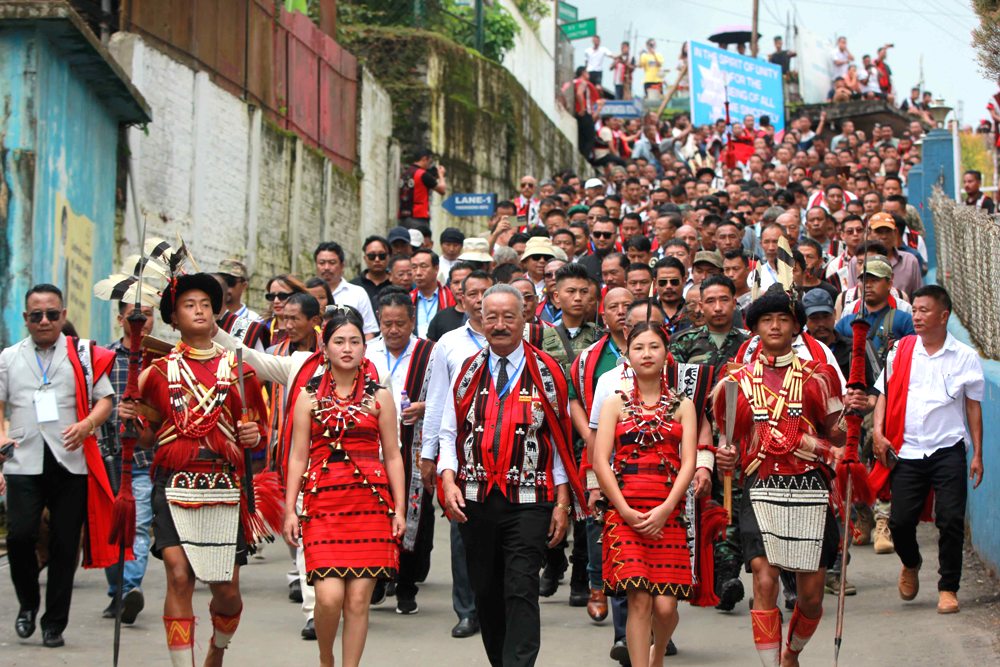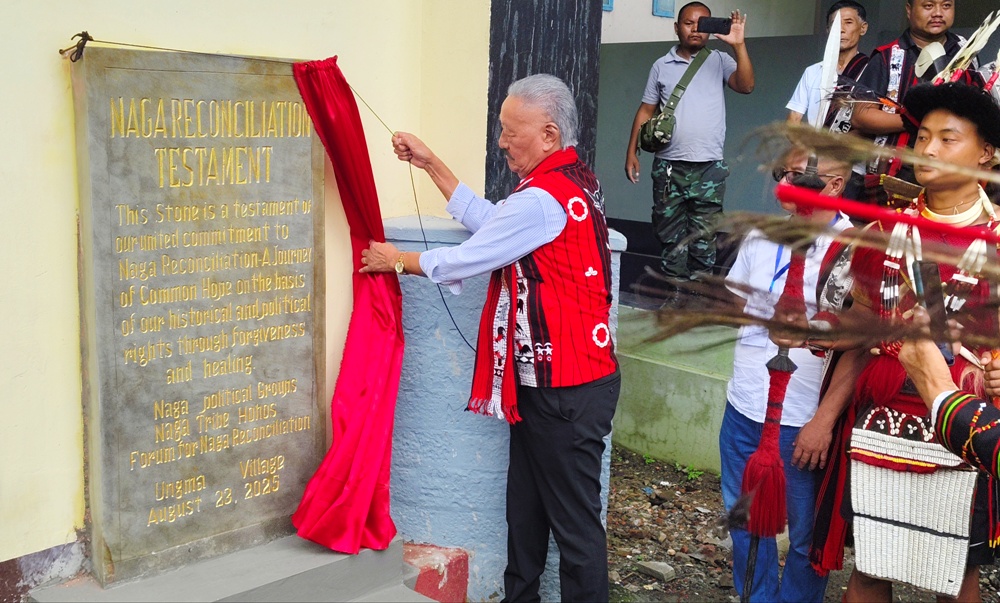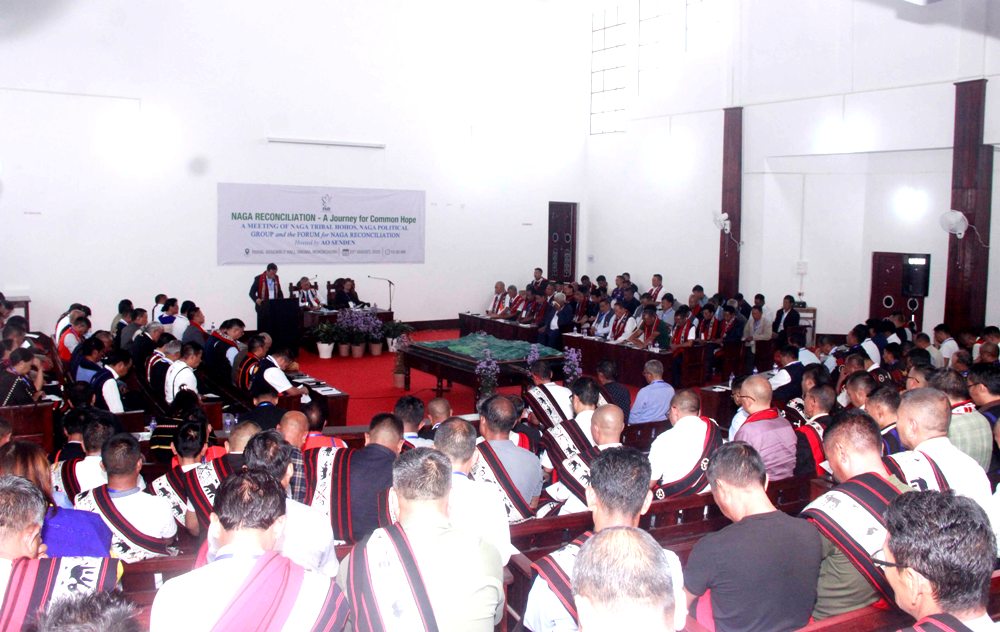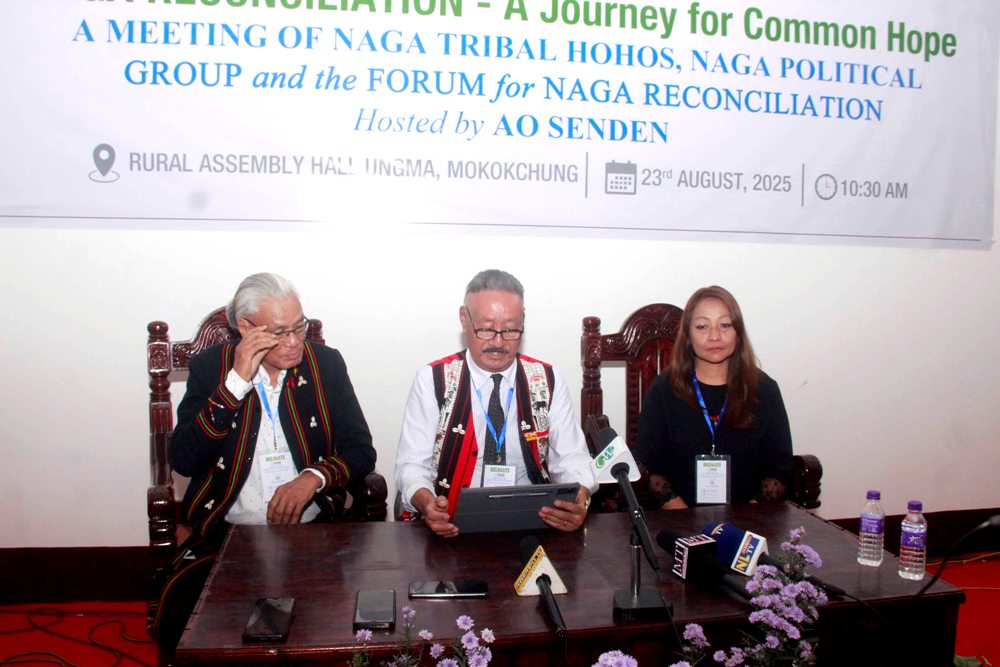At historic Ungma CNCR meeting, Naga leaders and tribal hohos unite, pledging reconciliation, common ground, and a shared future.
Share

UNGMA — In what is being hailed as a landmark occasion in the Naga people’s long and arduous journey towards reconciliation, leaders of 16 Naga political groups (NPGs), 34 tribal hohos from across Arunachal Pradesh, Assam, Nagaland and Manipur, and the Forum for Naga Reconciliation (FNR) came together on Saturday at Ungma village in Mokokchung district for the Council of Naga Cooperation and Relationship (CNCR) meeting.
The convener of FNR, Rev. Dr. Wati Aier, declared the day a “Winning Day” for the Naga people—“a day etched into our collective memory as a testament of our resolve, unity, courage, and the enduring pursuit of a shared future.”
The choice of Ungma village as the venue carried deep cultural symbolism. To mark the significance of the event, the village observed a sacred genna, Süngkhum Shipang (closure of village gates), on August 22 and 23.
The ritual signified communal commitment to reconciliation and convergence and was acknowledged by the FNR as a powerful act of solidarity.
Read more: Governor-designate Ajay Kumar Bhalla arrives in Nagaland
A monolith commemorating the Naga Reconciliation Testament was unveiled by Rev. Dr. Aier before the formal proceedings. The ceremony was followed by a closed-door meeting and later a press conference, where the FNR released the landmark “Ungma Statement.”

The statement affirmed continuity with earlier declarations, including the January 14, 2025 Treatise, and reiterated affirmations and resolutions made throughout the year. It planted a resounding call for all Naga political groups to converge at a ‘Common Ground’ to pursue a shared political vision based on the Naga people’s historical and political rights.
“This assembly reiterates an earnest and unified call: that all Naga political groups, with the clear-cut support of the tribe hohos, will converge at a Common Ground to articulate and pursue a shared political vision,” the statement read.
Importantly, the declaration rejected preconditions and divisive narratives, urging leaders to commit themselves to reconciliation, active listening, and decisive action. The FNR described the declaration as “a covenant, not a mere procedural outcome.”
It stated: “The peoples' collective voice has decisively chosen to rise above fragmentation and division, embracing forgiveness and healing, to honour the sacrifices of past generations, and to walk together toward a future defined by dignity, justice, and peace.”

The statement ended with an emphatic proclamation: “Let this be remembered as the day the Naga people chose convergence over fragmentation, vision over rhetoric, and future over fear. Therefore today we confess and declare that Nagas are one. God be our help!”
Voices from the assembly
In his host address, Ao Senden president Marsanen Imsong praised the FNR’s 18 years of perseverance in pursuing reconciliation. He urged Naga leaders to use their words to heal rather than divide.
Imsong reminded the gathering that true reconciliation begins in the heart and requires courage to move beyond the burdens of the past. “History will remember us not for titles, but for what we build—a legacy of unity or conflict,” he said.
Also read exclusive: Nagaland: Illness anxiety drives patients online, raising mental health concerns
Dr. Visier Sanyü, a member of FNR, described the meeting as a “new dawn for the Naga nation.” He invoked the vision of AZ Phizo, the pioneer of Naga nationalism, stressing that reconciliation was both a spiritual and political necessity.
On the occasion, Sanyü called for forgiveness and dialogue to heal divisions. “When we reconcile, we are stronger than ever,” he said, adding that reconciliation must also pave the way for a dignified settlement with both India and Myanmar.
“We must hand down to our children not more graves, but a garden of peace and hope,” he said.
Momentum from past sessions
FNR convener Rev. Dr. Wati Aier reminded the press that the Ungma meeting built on positive momentum from the earlier session hosted by the Angami Public Organisation, where NPGs had openly acknowledged past mistakes—a rare and transformative admission.

“Today, FNR has pushed this positive note further, with NPGs advocating for a resolute decision,” he said, adding that the Ungma meeting was the largest gathering of NPGs and tribal hohos to date.
Rev. Aier urged the Naga groups to move beyond ideological divides between the Framework Agreement and the Agreed Position. “Don’t talk about the Framework or Agreed Position. Let us stop dwelling on the past and go beyond,” he said.
According to Dr. Visier Sanyü, a significant consensus was reached among NPGs during the closed-door sessions. “They agreed that there cannot be two agreements. We are one people,” he said.
When asked whether NPGs owe an apology to younger generations for the prolonged lack of unity and vision, Sanyü was candid: “FNR cannot speak for NPGs, but personally, I believe NPGs absolutely owe an apology to the younger generation.”